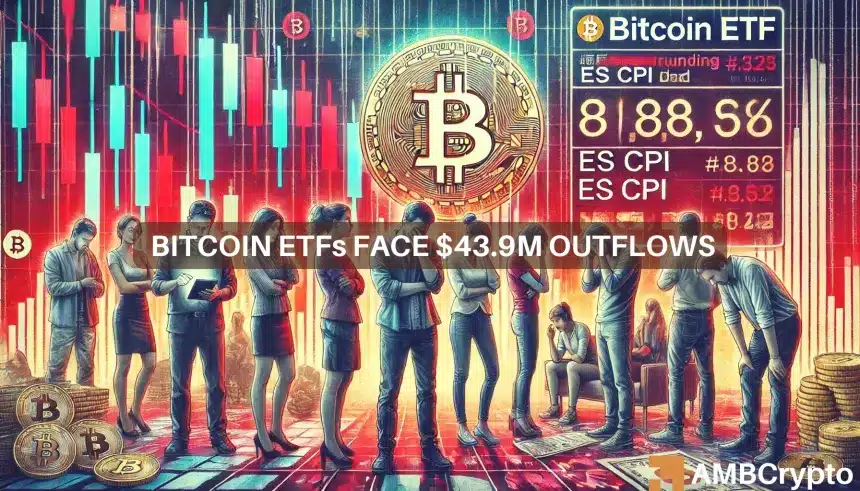- Bitcoin and Ethereum ETFs saw short-lived inflows, followed by significant outflows.
- US CPI data impacted ETF flows, with cryptocurrencies recovering despite initial declines.
After days of continued outflows, Bitcoin [BTC] ETFs had a brief revival with inflows on September 9 and 10.
However, this revival was short-lived.
Bitcoin ETF suffers from outflows
On September 11, the trend reversed sharply, with net outflows totaling $43.9 million. Farside Investors.
This abrupt shift ended a two-day streak of positive inflows, highlighting the volatile nature of BTC ETF investing in the current market environment.
Surprisingly, BlackRock’s IBIT has been stagnant since August 26 with zero flows, apart from a notable outflow of $9.1 million recorded on September 9.
Meanwhile, only Fidelity’s FBTC and Invesco’s BTCO have shown positive movement, with inflows of $12.6 million and $2.6 million respectively from September 11.
In contrast, Ark Invest and 21Shares’ ARKB saw significant outflows totaling $54.0 million, according to Farside Investors.
Additionally, Grayscale’s GBTC reported net outflows of $4.6 million, underscoring the continued volatility and changing dynamics in the Bitcoin ETF market.
Ethereum ETF Analysis
So is Ethereum [ETH] ETFs reflected the recent swings in BTC ETFs.
After a period of outflows, ETH ETFs saw a brief surge on September 10 with an inflow of $11.4 million. Farside Investors.
However, this positive trend was short-lived as a cumulative outflow of $0.5 million occurred the following day.
While most Ethereum ETFs recorded no outflows, Fidelity’s FETH saw a modest inflow of $1.2 million, while VanEck’s ETHV saw outflows totaling $1.7 million.
This divergence highlights an unusual pattern where BlackRock’s ETFs have consistently stagnated, in stark contrast to Fidelity’s ETFs, which have shown resilience.
On the price front, both Bitcoin and Ethereum saw declines on September 11.
Still, both cryptocurrencies recovered on September 12, with BTC gaining 3.3% within a day and ETH rising 1.58%. CoinMarketCap.
What causes this?
The sudden shift in ETF flows and cryptocurrency prices can be attributed to the recent developments issued US Consumer Price Index (CPI) data.
The August CPI revealed a modest 0.2% increase in consumer prices, pushing annual inflation down to 2.5% – the lowest level since February 2021. CNBC reports this.
This data has prompted Citi to forecast a more conservative 25 basis point rate cut at the upcoming Federal Open Market Committee (FOMC) meeting.
Despite this expected adjustment, Citi’s analysis highlights that core PCE inflation, a critical driver of Fed policy, remains stable, indicating a balanced approach to monetary policy in the near term.
As expected, Rachael Lucas, a crypto analyst from BTCMarkets, said it best:
“The outflows from Bitcoin and Ethereum ETFs are largely a response to stronger US economic data and should be seen as a normal part of ETF evolution.”

